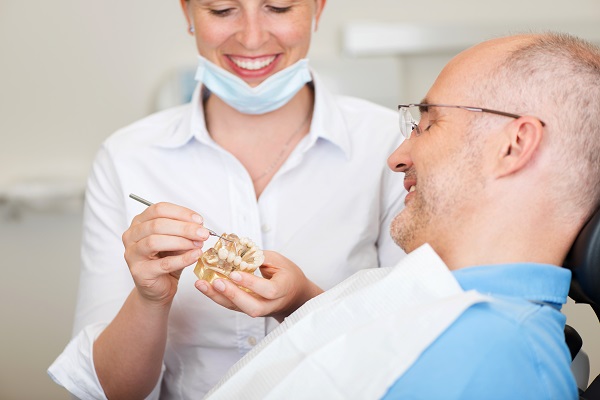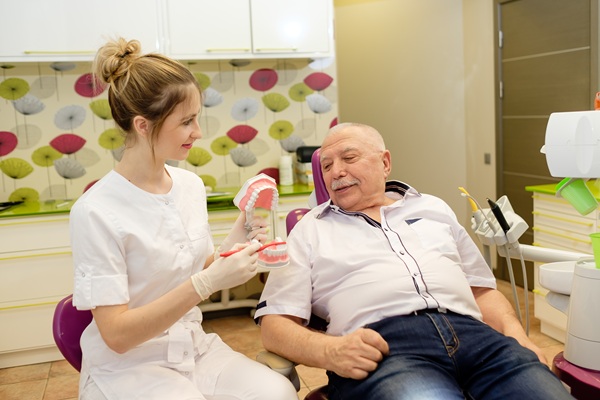Visit Your Family Dentist to Treat a Cracked Tooth

If there is sudden pain in a tooth, a visit to a family dentist can determine if the tooth is cracked. Cracked teeth can occur in various fashions.
How to identify a cracked tooth
Causes
Biting into something hard, like the pit of stone fruits, may cause a crack. So could a direct blow, possible in car accidents or street fights. Unassuming causes, like the grinding of teeth and drastic changes in mouth temperature from hot to cold, may also cause a tooth to crack.
Symptoms
Symptoms to beware of if any of the previous scenarios have occurred are various. Pain while chewing, especially upon releasing the bite is typical. Cracked teeth can also become particularly sensitive to extreme temperatures. Enamel, the outer layer of teeth, covers loads of nerve endings which are exposed when teeth are cracked. This explains the phenomena of temperature sensitivity. Throbbing throughout the day and unusual swelling around a tooth are two other symptoms to look out for. Experiencing any of these symptoms is just cause to seek out a family dentist.
Types of cracked teeth the family dentist might find
May not need treatment
The most insignificant type of crack is referred to as a craze line. This crack of the enamel is superficial, typically asymptomatic and not requiring treatment. Fractured cusps are cracks that typically happen around a previous filling. If they do not penetrate to the core of the tooth, they can also be painless and not require treatment.
Needing treatment
Vertical cracks that extend down to the gum line are much more serious, usually causing symptoms that require treatment to resolve. Cracks can also rise vertically from the root. If these cracks become infected, they may be cause for extraction. Otherwise they are usually asymptomatic.
Diagnosis and treatment
Diagnostic methods
Diagnosing a cracked tooth is notoriously difficult. There are some common methods. The dentist will take a look at the patient under proper light and magnification while asking about the patient’s history, i.e., have they experienced any of the common causes and symptoms. A tool may also be used to probe for the crack or locally inflamed gums which might signify a vertical crack. If a bite test reveals nothing but the dentist is still concerned, they may employ a dye test. X-rays are relatively ineffective in discovering cracked teeth.
Treatment options
The treatment a family dentist will resort to depends on the severity of the cracked tooth. Some cracks can be repaired by bonding the crack with a plastic resin. In other cases, a crown is required. This typically involves shaving off some enamel to fit the crown. If soft tissue in the tooth’s core has been damaged, the dentist may prescribe a root canal to prevent the tooth from growing weaker. The worst-case scenario is the tooth must be extracted.
Conclusion
Whether they occur as the result of direct contact, grinding or rapid cooling, cracked teeth can be very painful insecure cases. Symptoms to look out for are pain when releasing pressure while chewing and sensitivity to extreme temperatures. When they come up dentists have various methods for diagnosing and treating cracked teeth which vary with the severity of the crack.
Are you considering a family dentist in the Houston area? Get more information at https://www.drbrucematson.com.
Check out what others are saying about our services on Yelp: Read our Yelp reviews.
Recent Posts
If your visit to the dentist revealed that you have dental cavities, you have to start considering different ways to reverse the tooth decay process. Of course, while we were young, we all heard that sugars are harmful to our teeth. That did not exactly discourage us from eating candy, though. The fact is that…
If you have tooth or gum pain and are wondering if you should visit the dentist, you are facing a decision millions of people have to deal with every year. In general, most dental problems require the assistance of a dentist or at least a dental hygienist. However, some dental maladies are worse than others.If…
Done regularly, dental cleanings contributes to a person’s long-term oral health. Professional teeth cleaning removes plaque buildup, targeting hard-to-reach spots that you may miss when you brush and floss.Usually, professional dental cleaning takes place in two contexts, the first being a routine checkup. General dentists incorporate teeth cleaning into routine dental visits after they examine…
General dentistry focuses on routine oral health care for patients of all ages. This includes oral maintenance such as cleanings and examinations, as well as general treatments and preventive care. Preventive care often gets overlooked as it relates to general dentistry, however, it plays a key role in oral health. Keep reading to learn more…


